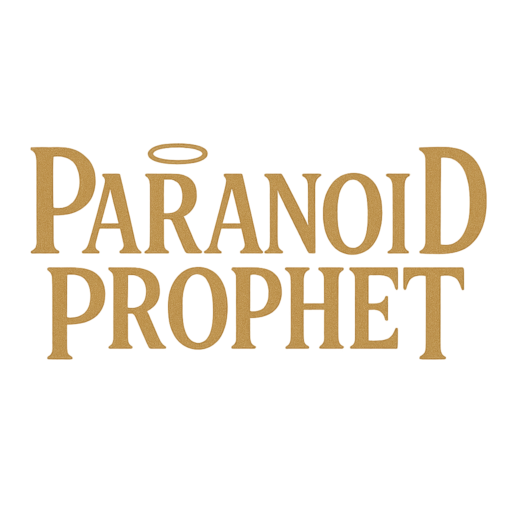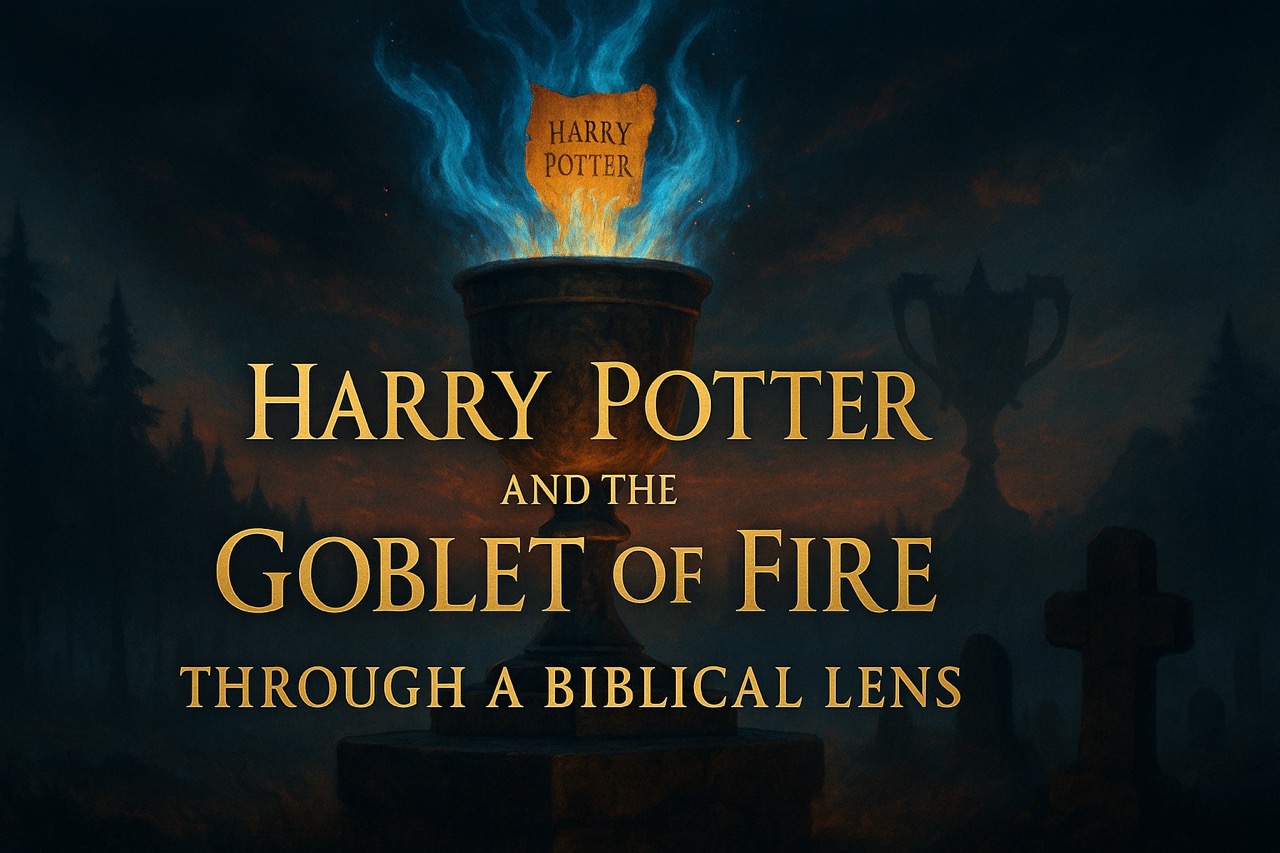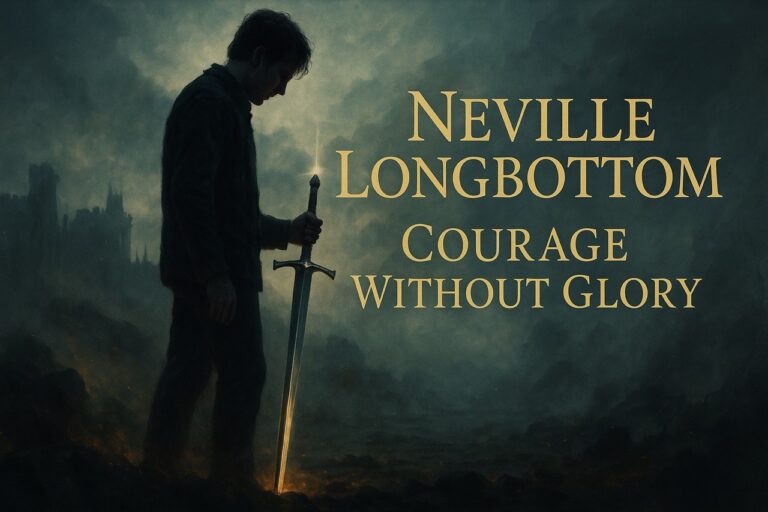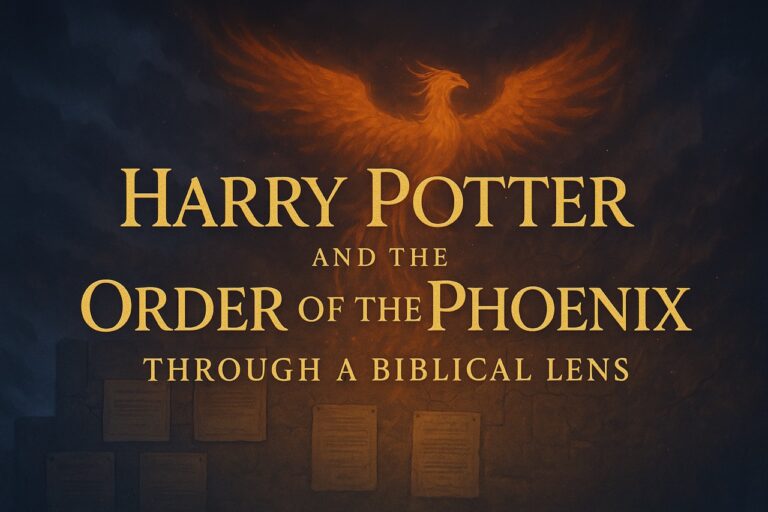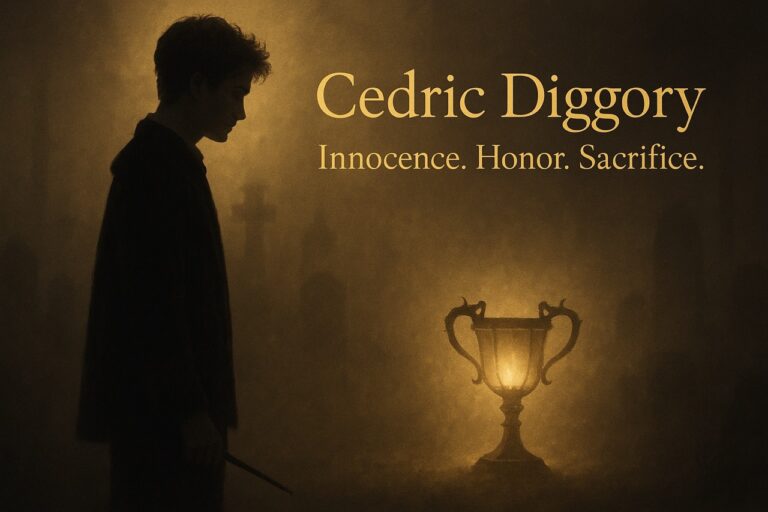This Goblet of Fire biblical review steps into one of the darkest turns in the Harry Potter series — where childhood games become deadly, and deception wears the face of trust. In this chapter, Harry is chosen against his will, tested by fire, surrounded by confusion, and eventually witnesses a mock resurrection that mimics the most sacred event in Christian history. Through a biblical lens, this story becomes more than a tournament — it’s a spiritual warning about false teachers, corrupted signs and wonders, and the cost of standing in the truth. This review will explore what the film gets right, what it distorts, and how Christian families can use its symbolism as a conversation starter for faith and discernment.
🧒⚠️ Parental Review: Is Goblet of Fire Age-Appropriate?
Suggested Viewing Age: ★★★☆☆ (11+ with strong guidance)
Parental Discernment Level: Very High
Goblet of Fire is the turning point of the series — where magical whimsy gives way to life-and-death spiritual warfare. The themes are weightier, the imagery darker, and the moral complexity more intense than anything that came before.
⚠️ Content Warnings for Christian Families:
- Blood magic and false resurrection – Voldemort is reborn in a ritual involving bone, blood, and stolen life — a mockery of true resurrection and sacrifice
- Deception by trusted authority – “Mad-Eye Moody” turns out to be a disguised villain manipulating the entire tournament
- Murder of an innocent – Cedric Diggory is killed without warning, his death used as a plot device and turning point
- Intense violence and horror elements – The graveyard resurrection scene is visually disturbing and emotionally heavy
- Magical trials & forced participation – Harry is chosen to compete against his will, a narrative of being “called” into suffering
🗣️ Family Discussion Topics:
- What does the Goblet of Fire symbolize spiritually? Is it divine calling or spiritual testing?
- How do false teachers gain trust? Why is discernment important, especially when evil disguises itself?
- Why is Cedric’s death so sudden? What does Scripture say about innocent suffering and unjust death?
- Is Voldemort’s resurrection a counterfeit gospel? How does it distort the concept of eternal life?
- How does Harry respond to trauma, fear, and grief? Can Christians relate to this kind of pressure?
🧠 What This Goblet of Fire Biblical Review Reveals on Rewatch
The first time you watch Goblet of Fire, it feels like a magical tournament gone horribly wrong. But on rewatch — especially through a biblical lens — this chapter becomes a spiritual parable about deception, trials, and corrupted resurrection.
🔥 Harry Is Chosen for a Trial He Didn’t Ask For
Harry’s name is pulled from the Goblet — not by his own doing — and he’s forced into a gauntlet of fire, danger, and judgment.
This echoes a powerful biblical theme: being called into suffering without asking for it.
Like Joseph thrown into a pit, like Daniel cast into a den, like Christ walking toward the cross — Harry is thrust into something larger than himself. And his trials purify him — emotionally, morally, and spiritually.
“Do not be surprised at the fiery ordeal that has come on you to test you…” – 1 Peter 4:12
🎭 Mad-Eye Moody Is a Mask for the Enemy
Throughout the film, Harry (and the audience) trust Mad-Eye Moody. He mentors Harry, protects him, and seems wise — until the devastating twist: he’s not Moody at all.
It’s Barty Crouch Jr., a Death Eater in disguise, manipulating the tournament from the inside.
This is spiritual gold — a perfect picture of false shepherds and deceptive leaders warned about in Matthew 7:15:
“Beware of false prophets, who come to you in sheep’s clothing but inwardly are ravenous wolves.”
🕯️ Cedric Diggory as the Innocent Caught in Evil’s Path
Cedric is kind, fair, brave — and unprepared. He doesn’t seek greatness, and he doesn’t deserve what happens.
His death is abrupt and unjust — but deeply meaningful.
It awakens the world to the return of evil.
It ends the “game” and begins the war.
Cedric becomes a symbol of the innocent sufferer — a shadow of righteous death that provokes awakening, much like the early Christian martyrs (Acts 7).
🩸 Voldemort’s Resurrection Is a Twisted Gospel
In the graveyard, Voldemort returns through a blood ritual, using:
- Bone of his father
- Flesh of a servant
- Blood of the innocent
It’s meant to feel unholy. And it is.
This scene is a blasphemous inversion of the resurrection of Christ — where instead of love and surrender, Voldemort rises through theft, death, and domination.
His return marks the rise of false miracles, counterfeit signs, and mock salvation — just as Scripture warns in 2 Thessalonians 2:9–10.
✝️ Biblical Truths in Goblet of Fire
While the fourth film in the series leans darker than any before it, it also offers unexpected reflections of suffering, testing, discernment, and redemptive sacrifice — all deeply rooted in Scripture.
🔥 Trials Purify the Faithful
Harry’s entry into the Triwizard Tournament mirrors biblical figures who were chosen for trials they didn’t choose — from Joseph to Job to Jesus.
Each trial in the tournament forces Harry to rely on courage, wisdom, humility, and self-sacrifice — not power.
“These trials will show that your faith is genuine… tested as fire tests and purifies gold.” – 1 Peter 1:7
The takeaway isn’t “win the game,” but endure the fire and emerge transformed.
🧙♂️ Discernment Is a Spiritual Discipline
The “Mad-Eye Moody” deception is one of the clearest biblical analogies in the series. For nearly the entire film, evil wears the face of a friend.
This affirms biblical warnings:
“Satan himself masquerades as an angel of light.” – 2 Corinthians 11:14
“Test the spirits to see whether they are from God.” – 1 John 4:1
Crouch Jr.’s disguise reminds us that not everyone who guides us is good — and that truth must be tested, not assumed.
✝️ Sacrifice Awakens the Sleeping
Cedric Diggory’s death isn’t just a tragedy — it’s a turning point. His innocence, extinguished without cause, becomes the moment that wakes the world from denial.
It reflects the principle that righteous suffering often stirs repentance or urgency in others — like the martyrdom of Stephen in Acts 7 or the early church’s persecution.
“Precious in the sight of the Lord is the death of His faithful servants.” – Psalm 116:15
🧠 The True Victory Is Moral, Not Magical
Harry wins nothing — except the knowledge of what evil really looks like. He returns not triumphant, but changed. A witness. A truth-bearer.
In the Bible, the greatest victories come through surrender, not domination. And Goblet of Fire ends with Harry choosing truth, even when the world prefers denial.
“Have nothing to do with the fruitless deeds of darkness, but rather expose them.” – Ephesians 5:11
⚠️ Goblet of Fire Biblical Review: Where It Clashes with Scripture
While Goblet of Fire contains echoes of spiritual truth, it also presents profound theological contradictions that Christian viewers should approach with discernment. The danger isn’t always what’s shown — it’s what’s subtly normalized.
🪄 Magic as Salvation — Again
As in all previous films, magic is portrayed as the default solution: to escape, to defend, to reveal truth, or to resurrect. Even Harry’s triumph in the maze and graveyard is attributed to spellwork, not character or divine intervention.
This distorts the biblical truth that only God saves — not through spells or rituals, but by grace through faith (Ephesians 2:8–9).
🩸 Voldemort’s Resurrection Parodies the Gospel
The graveyard resurrection is spiritually offensive not just for its horror, but for its theological inversion:
- Blood is used without repentance
- Sacrifice is stolen, not offered
- Power returns to evil, not to good
This ritual mimics the structure of Christ’s resurrection, but with no love, no mercy, and no justice — only domination and fear.
“Woe to those who call evil good and good evil…” – Isaiah 5:20
⚖️ Justice Is Subjective, Not Eternal
Crouch Jr. is punished not for his sin against God, but because his deception was discovered. Voldemort is feared, not condemned. No character looks upward — only inward.
There’s no eternal judgment, no appeal to divine truth, and no higher authority.
The Bible presents a clear contrast:
“God is a righteous judge, a God who displays His wrath every day.” – Psalm 7:11
🌑 The Afterlife Is Absent or Twisted
Cedric’s death is treated with emotion — but not hope. There’s no concept of eternity, resurrection, or divine justice. The story ends with pain… but no spiritual resolution.
For Christian viewers, this is a reminder that without the gospel, even sacrifice leads only to silence.
“If in Christ we have hope in this life only, we are of all people most to be pitied.” – 1 Corinthians 15:19
🔥 Final Reflection – A Goblet of Fire Biblical Review
Goblet of Fire marks the moment Harry’s world — and ours — changes. The tournament begins as a game, but ends in a graveyard. A friend dies. Evil rises. And the world looks away.
For Christians, this story echoes a sobering truth: not all trials are self-chosen, and not all guides are trustworthy. Sometimes we are called — like Harry — into a fire we didn’t ask for. But it’s in that fire that truth is revealed, character is refined, and light begins to separate from shadow.
The death of Cedric Diggory isn’t redemptive in itself… but it wakes people up. In the same way, Scripture reminds us that the death of the innocent — above all, Christ — is meant to shatter illusions, pierce darkness, and call the world to account.
So what do we do with Goblet of Fire? We don’t ignore it… but we don’t absorb it blindly either. We test it. We discuss it. We use it — not to feed our imagination alone, but to sharpen our spiritual discernment. Because the battle ahead won’t be won by magic — but by truth, sacrifice, and the One who already conquered the grave.
🔗 External Christian Reviews of Goblet of Fire
- Plugged In (Focus on the Family)
Offers a detailed analysis, noting the film’s darker tone and the death of a student, emphasizing the need for parental guidance.
Read the review - ChristianAnswers.net
Discusses the film’s portrayal of evil and its impact on younger audiences, while also addressing the ongoing debate about witchcraft in the series.
Read the review - Christian Answers for the New Age (Marcia Montenegro)
Provides a critical evaluation, highlighting the film’s darker themes and the potential spiritual implications for viewers.
Read the review - Dove.org
Notes the increased intensity of wizardry, language, and violence in this installment, expressing concern over the series’ direction.
Read the review - Movieguide
Critiques the film for promoting a pagan worldview and occult content, warning of its potential dangers, especially to children.
Read the review - Christianity Today
Offers a balanced perspective, acknowledging the film’s emotional depth and its pivotal role in the series’ overarching narrative.
Read the review
📖 Related Reading on Paranoid Prophet
🧠 Identity, Condemnation & Redemption
- Was Jesus a Liar?
- Was Jesus a Madman?
- Jesus in Revelation 1 – Eyes Like Fire
- Proverbs 13:20 – The Company You Keep
- Proverbs 16:28 – Whisperers and Division
😈 Spiritual Warfare, Sin Nature & the Inner Struggle
- Proverbs 14:12 – The Way That Seems Right
- Proverbs 109 Explained – False Accusation and Justice
- Messianic Prophecies of Jesus’ Suffering
- Moloch Worship & Modern Media Parallels
🌟 Memory, Light, and Hope as Weapons
- Proverbs 4:18 – The Path of the Righteous
- Proverbs 18:21 – Power of the Tongue and Spirit
- Who Is God? A Simple Breakdown
📖 Previous Harry Potter Reviews
- Harry Potter and the Sorcerer’s Stone – A Biblical Review
- Harry Potter and the Chamber of Secrets – A Biblical Review
- Harry Potter and the Prisoner of Azkaban – A Biblical Review
🙋♂️ Frequently Asked Questions (Christian Perspective)
❓What does the Goblet of Fire represent spiritually?
The Goblet can symbolize divine testing or calling — a “refiner’s fire” that selects someone for a purpose beyond their choosing. It echoes biblical themes of chosen suffering and spiritual trials (1 Peter 1:7).
❓Is Cedric Diggory a Christ figure?
Not directly — Cedric doesn’t offer himself as a sacrifice. But his sudden, unjust death functions as a wake-up call to a sleeping world, much like the deaths of innocent prophets and martyrs in Scripture.
❓Is Voldemort’s resurrection a mockery of the gospel?
Yes. His return is structured like a perverse resurrection — using blood, bone, and betrayal. It mirrors the shape of redemption while reversing its motive, glorifying domination instead of love. It’s a spiritual counterfeit (2 Thessalonians 2:9–10).
❓How should Christians think about magic in Goblet of Fire?
Magic is the default savior in the story, but from a biblical view, this substitutes human power for God’s grace. Christians should watch with discernment and discuss how the story differs from Scripture’s view of power, salvation, and truth.
❓What does this movie say about suffering?
Harry is forced into trials, watches a friend die, and returns wounded — not victorious. But this mirrors reality. The Bible teaches that suffering refines, not destroys — and that resurrection only comes after the grave (Romans 8:18, James 1:2–4).
